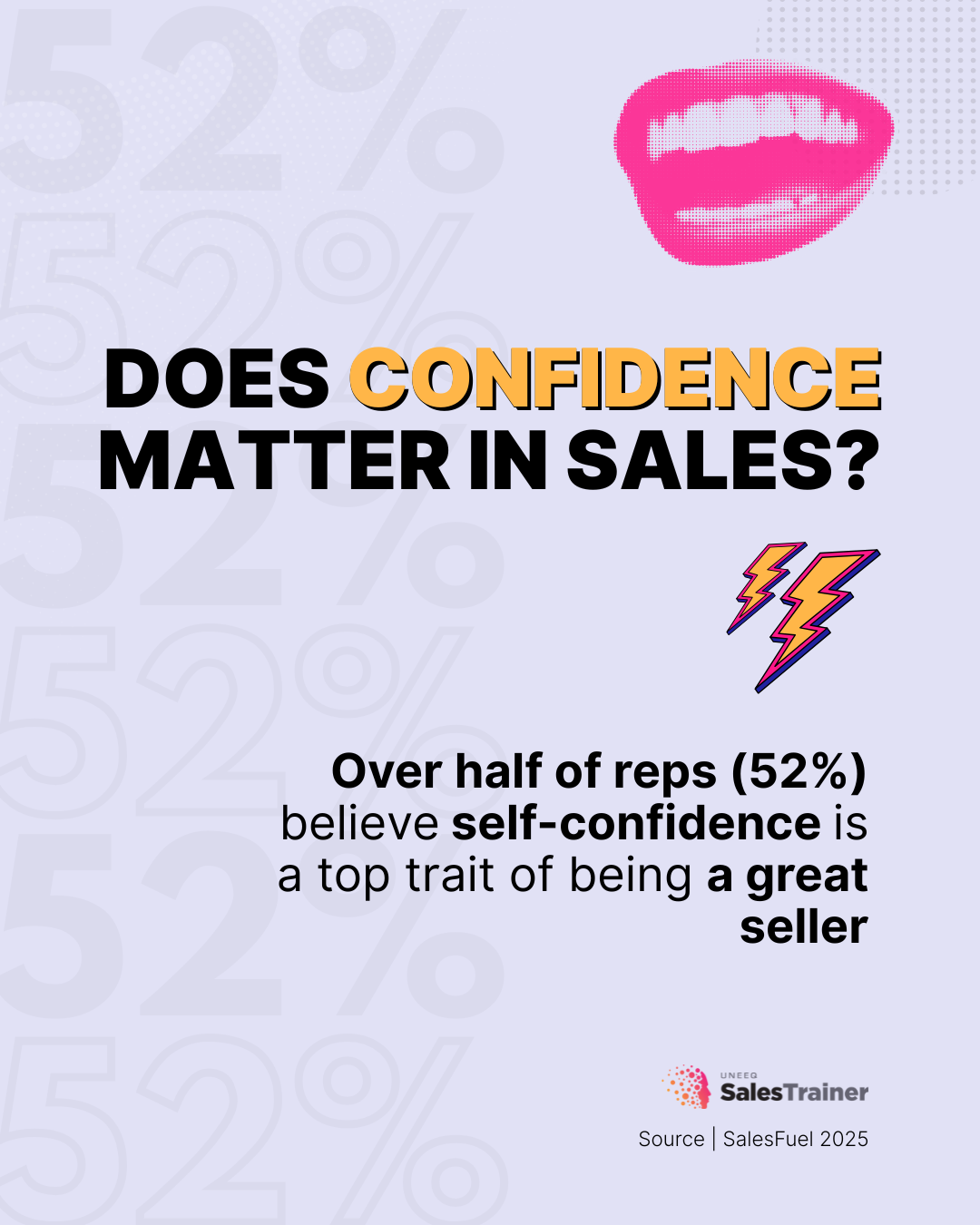How important is confidence in sales? And, more importantly, can it be coached to improve sales performance?
.png)
The staggers. The waggles. The jerks. The whisky fingers. They're all nicknames for a phenomenon more commonly known as the 'yips'. In salespeople it might manifest as call reluctance, losing your pitch, or even nervously overtalking. And they’re not alone.
Athletes worldwide will know (and fear) what a case of the yips – a sudden, unexplainable loss of ability and confidence – can do to a promising career. Scottish golf champion Tommy Armour is said to have popularized the term after the yips left him unable to putt, leading to his retirement from tournament play.
Similar conditions have also struck cricketers, tennis players, snooker players, and many others, robbing them of the skills that were once second nature.
For years, the yips were thought to be purely psychological – a case of performance anxiety causing even the most accomplished athletes to buckle under the pressure in big moments. More recently, experts think neurological problems may play a part.
One thing is clear though: confidence that took years to build can be quickly lost, and once gone, may be really difficult to get back.
As a sales leader, you'll know how vital confidence is in sales. And whether it's one of your best sellers going through a rough patch, or that new rep you know will be great if they can just get over their nerves, the yips can strike almost anyone on your team.
So, what can sales leaders do to scale confidence in their teams and keep nerves at bay? Just as importantly, how can you recapture someone's confidence once it's been knocked?
Well, that might not be such a difficult question to answer these days.

You won't be too surprised to hear the consensus on confidence is that it's pretty good to have.
Over half of reps (52%) believe self-confidence is a top trait of being a great seller, according to SalesFuel. And it's not just reps who benefit from having the wind in their sales (see what I did there?).
The best sales managers are 67% more likely to feel extremely or very confident about their ability to help their teams achieve better results.
In fact, research has shown that having confidence in yourself is a more reliable indicator of better workplace performance than a person's job satisfaction, conscientiousness, or even experience.
Okay, so just be confident, right? If only it were that easy. But confidence can be fickle.
When reps are on a roll, the wins seem to keep on coming, creating a buzz and energy that's infectious. This usually leads to more successes and even higher confidence.
Sadly, the opposite is also true. A fluffed deal, a slow month, or just a stroke of bad luck can turn an unexpected slump into a self-fulfilling prophecy. Confidence drops and performance worsens, which throws a rep off their game even more.
Worst of all, it can spread to the rest of the team.
In a UNSW study, an actor was placed among unsuspecting students during a project and told to play the role of a pessimist. He spent his time telling everyone the project would fail, saying it was impossible.
The result? A 30-40% drop in performance compared with control groups across dozens of experiments. Everyone else in the team became sceptics too.
Fortunately, there is a new way for organically boosting confidence in your teams: giving them a place to practice, a safe space to make mistakes and learn, with immersive AI sales roleplay.
It's not hard to see why some reps lack confidence when 56% claim they've never received formal sales training. This could also be a big reason why as many as nine out of 10 sales teams miss quotas each year.
Usually, the most important time to build a rep's confidence is when they're learning the ropes. Spekit data show nearly half of reps have walked away from a job because of a poor onboarding experience.
On the other hand, sellers with less than five years' experience are 240% more likely to become top performers if they have an effective manager helping them, and that includes helping them with their sales training.
.png)
I get why it can be difficult, though. Sales managers are already stretched thin. They're chasing their own quotas while also trying to look after their teams, which means coaching often slips down the list. In reality, sales managers spend around 55% of their time on admin and only (at best) 21% of their time coaching reps—much less time than sales leaders want them to spend.
This is where sales roleplay tools like UneeQ Sales Trainer help.
Instead of waiting for a manager to carve out an hour for roleplay (which can be awkward at the best of times), reps can practice whenever they want using digital humans— AI that’s designed specifically to support building their skills and confidence.
Whether they're a new starter, a veteran, or someone in the middle aspiring to be great, your reps take part in realistic tailored scenarios that mimic the conversations they face every day, creating an immersive practice environment.
Are they struggling with discovery? Finding it difficult to close? Or perhaps their conversational skills need a bit of finessing?
AI roleplay is making a very real difference in all these areas. Reps get a place to practice their pitch, a batting cage where they can lock in, hone their soft skill muscle memory, and gain confidence in their abilities as they see their scores rise.
And while sales managers get all the data and transcripts they need to see how each of their reps are performing, the reps don’t have to worry about ‘performing’ in their roleplays with an AI—there’s no judgement, just actionable advice.
Other than a declining number of meetings booked and deals closed, how do you spot when a sales rep is low on confidence? They don’t often tell you, after all.
If it's confidence you're tracking, you can check your AI sales roleplay platform for signs that your reps are struggling.
Maybe they're waffling a lot, leaving dead air, or umming and ahhing too much. Filler words can often suggest to the prospect a lack of command of the material, while over-talking is not just one of the deadly sins of sales, but a good way to derail discovery calls.
If your Sales Trainer metrics show either, your reps can keep practicing in a brand-safe and productive environment without risking real leads.

Excelling at sales training is a great confidence booster. And when reps can train whenever they need, 24/7, before an important meeting as well as on the regular, they have the means to get over any yips they might develop.
New hires ramp up faster and build confidence before their first live calls, while seasoned reps can continue to hone their skills, try new techniques, and regain momentum after a rough spell. And for managers, it provides visibility and consistency, while freeing them up to coach better, mentor more, and be a more valuable member of the team.
If this sounds like something you'd be interested in, I'd love to set you up with a free trial. We’re confident you'll see the benefits for yourself.
